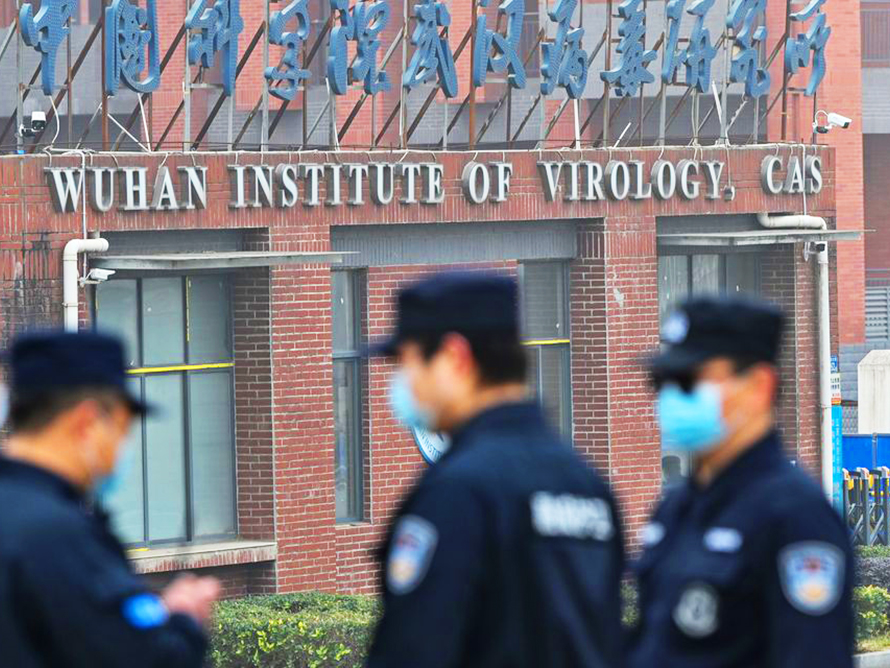Did the Covid-19 virus escape from a Chinese lab? The idea has long been dismissed by experts as a conspiracy theory – but a news report published yesterday suggests that it may be correct.
New evidence suggests Beijing caused pandemic
Did the Covid-19 virus escape from a Chinese lab? The idea has long been dismissed by experts as a conspiracy theory - but a news report published yesterday suggests that it may be correct.
Lab labyrinth
It was the scenario everyone at the Wuhan Institute of Virology dreaded. They studied diseases in laboratories. They always knew there was a chance that something could go wrong and someone could fall sick. Now, it seemed to have happened: three of their colleagues had been taken to hospital. They just had to hope that the illness would not prove fatal.
According to an article in the Wall Street Journal, the scientists were hospitalised in November 2019 - a month before the first officially confirmed case of Covid-19. If the information, based on a US intelligence report, is correct, they may well have been the first victims of Covid-19.
That would have huge repercussions for our understanding of the disease, and for world politics. It would mean not only that a blunder was responsible for the pandemic, but that a huge number of lives could have been saved if Beijing had revealed the problem sooner. Experts estimate that global cases could have been reduced by 95% if action to stem the pandemic had been taken three weeks earlier.
The result could be a global revulsion against China strong enough to end its hopes of becoming a dominant power. If correct, the Wall Street Journal story may prove the most important of our time.
Rumours that the pandemic originated in a state-run laboratory have been circulating since the beginning of the pandemic, but have not been given much credence.
The one thing generally agreed is that the virus originated in bats. The most generally accepted theory was that it passed to humans via another animal. But the fact that Wuhan is hundreds of miles from where the bats concerned are found, raises questions about why the first outbreak happened there. And the fact that Wuhan's institute specialises in bat-borne viruses may well supply the answer.
Research at the institute is believed to include combining viruses to see whether they become more infectious. It could be that Covid-19 was produced in this way - and then escaped. US officials who visited the laboratory two years ago warned that it was not as secure as it should be.
The Chinese authorities have always vehemently denied responsibility. They have suggested that the virus might have originated at a US military base in Maryland, or been imported to Wuhan via frozen food.
A joint report by Chinese experts and a World Health Organisation (WHO) team that visited Wuhan concluded that a laboratory leak was "highly unlikely". But the team was not given full access to the institute's records, and the report has been widely criticised for not considering the possibility of human error more thoroughly.
Eighteen scientists from universities including Cambridge, Harvard and Yale have demanded further investigations. Even the head of the WHO, Tedros Adhanom Ghebreyesus, has said that the report does not go far enough.
Did the Covid-19 virus escape from a Chinese lab?
Some say that it obviously did. It has always seemed too much of a coincidence that a virus originating in bats crossed to humans in a city that has a laboratory specialising in bat-borne diseases. The refusal of the Chinese authorities to be more open about Covid-19's origins is an indication of guilt. The revelation that three people from that lab were hospitalised at the same time is the final proof.
Others argue that it is impossible to say. There is just too much we do not know about the disease, and the issue is further complicated by politics. China argues that the US wants to damage its standing in the world by blaming it for the pandemic; China's critics say that it is evading responsibility through misplaced national pride. If the WHO team could not establish the truth, no one can.
Keywords
Wuhan - A city in eastern China with a population of 11 million.
Wall Street Journal - One of America's biggest-selling newspapers, known for its scrupulous fact-checking. It is named after New York's financial district.
Repercussions - The effects, usually bad, of an event or action.
Credence - Credibility. Both words derive from a Latin verb meaning to believe.
Hundreds of miles - The bats that carry the virus are thought to be native to the Yunnan region of southern China.
Joint report - The report concluded that the virus had probably been transmitted from bats to humans via another animal.
New evidence suggests Beijing caused pandemic

Glossary
Wuhan - A city in eastern China with a population of 11 million.
Wall Street Journal - One of America's biggest-selling newspapers, known for its scrupulous fact-checking. It is named after New York's financial district.
Repercussions - The effects, usually bad, of an event or action.
Credence - Credibility. Both words derive from a Latin verb meaning to believe.
Hundreds of miles - The bats that carry the virus are thought to be native to the Yunnan region of southern China.
Joint report - The report concluded that the virus had probably been transmitted from bats to humans via another animal.
